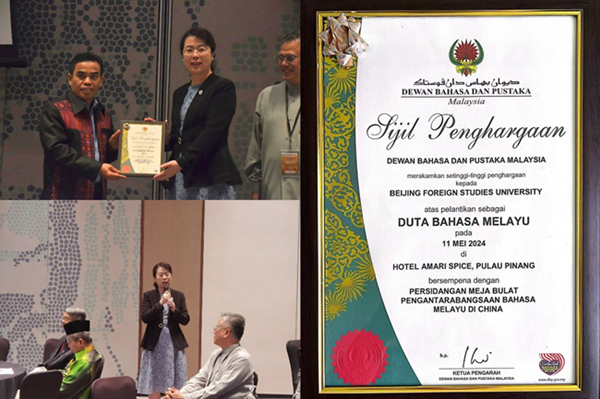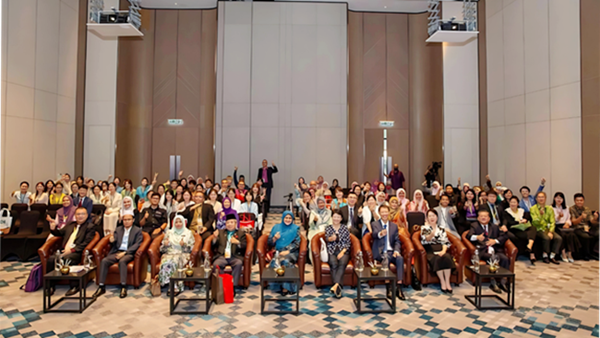- Research
- Research Centers
- Journals
- Admission
- Introduction
- Programs
- Application
- Alumni & Giving
- Alumni Club
- Giving
In commemoration of the 50th anniversary of diplomatic relations between China and Malaysia, the 2024 Malaysia-China Socio-Cultural International Symposium was held in Penang, Malaysia, on May 10.
This significant event was co-hosted by Beijing Foreign Studies University (BFSU) and Universiti Sains Malaysia (USM), and also received support from the Consulate General of China in Penang and the Institute of Language and Literature Malaysia.
It aimed to promote cultural exchanges and mutual understanding between China and Malaysia, further enhance the development of BFSU's Malay language major as a national first-class undergraduate program and explore new opportunities for China-Malaysia educational cooperation.

Su Yingying, dean of BFSU's School of Asian Studies, receives the International Malay Language Education Contribution Award and delivers a speech. [Photo/bfsu.edu.cn]
The symposium, themed "Reflecting on the Past, Forging the Future", featured a collection of 36 academic papers and promoted four new books co-compiled by BFSU and USM, covering Chinese and Malaysian scholars’ research findings in language teaching, translation, history and culture.
One of the highlights of the event was USM’s presentation of the International Malay Language Education Contribution Award. Among the recipients were Su Yingying, dean of BFSU's School of Asian Studies, and several teachers from Chinese universities.
At the roundtable meeting on the Development of Malay Language Education and Malay Studies in China held by BFSU's School of Asian Studies and USM's School of Humanities on May 11, representatives from 14 Chinese universities with Malay language programs engaged in active discussions with their counterparts from 13 Malaysian public universities.
They exchanged views on disciplinary construction, teaching improvement and development in Malay studies.
The Institute of Language and Literature Malaysia also awarded certificates to Chinese universities in recognition of their contributions to international Malay language education, with BFSU being China’s sole recipient of the Malay Language Promotion Ambassador title.
In her concluding remarks, Su expressed gratitude for the long-term support and assistance provided by Malaysian universities towards the development of Malay language and Malay studies in China. She reiterated the crucial role of language in enhancing people-to-people bonds and mutual learning among civilizations and extended an invitation to the participants to attend the fifth China-Malaysia Translation, Language and Culture International Seminar to be held in Beijing in May 2025.

Participants in the 2024 Malaysia-China Socio-Cultural International Symposium pose for a group photo. [Photo/bfsu.edu.cn]
The symposium significantly boosted the international academic standing of BFSU and its School of Asian Studies, paving the way for deeper cooperation with Malaysian universities and strengthening the foundation for educational collaboration and cultural exchanges between China and Malaysia.
Present at the opening ceremony were Zhao Changtao, education counselor of the Chinese embassy in Malaysia; Ding Qiao, deputy consul general of China in Penang; Habibah A. Wahab, deputy vice-chancellor of USM; Hazami Jahari, director-general of the Institute of Language and Literature Malaysia; and Senator Awang Adek Hussin.
Nearly 100 representatives of both countries' universities participated in the event.